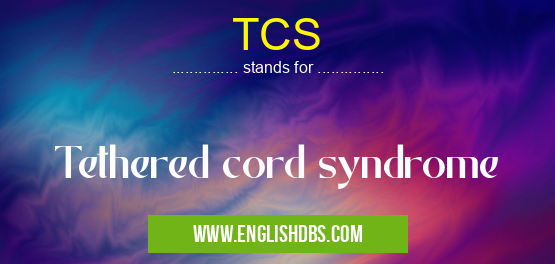What does TCS mean in ORTHOPAEDIC
Tethered cord syndrome (TCS) is a rare condition that occurs when the spinal cord is abnormally attached to the surrounding tissues, typically at the lower end of the spinal canal. This abnormal attachment can restrict the movement of the spinal cord and cause various neurological problems.

TCS meaning in Orthopaedic in Medical
TCS mostly used in an acronym Orthopaedic in Category Medical that means Tethered cord syndrome
Shorthand: TCS,
Full Form: Tethered cord syndrome
For more information of "Tethered cord syndrome", see the section below.
» Medical » Orthopaedic
What is TCS
TCS is a congenital condition, meaning it is present at birth. It is caused by an abnormal development of the spinal cord during pregnancy. In most cases,TCS affects the lower end of the spinal cord (lumbar or sacral region), but it can also occur in the cervical or thoracic region.
Symptoms
The symptoms of TCS can vary depending on the severity of the condition and the location of the tethered cord. Some common symptoms include:
- Weakness or numbness in the legs or feet
- Difficulty walking or running
- Scoliosis or curvature of the spine
- Pain in the back or legs
- Bladder or bowel incontinence
- Sensory disturbances, such as a decreased sensation of touch or temperature
Diagnosis
TCS is diagnosed based on a physical examination, a thorough medical history, and imaging tests. Imaging tests, such as an MRI or CT scan, can help visualize the spinal cord and identify any abnormalities.
Treatment
The treatment for TCS usually involves surgery to release the tethered spinal cord and restore its normal function. Surgery is typically successful in improving the symptoms and preventing further neurological damage. In some cases, physical therapy or other supportive treatments may be necessary to help patients regain function and improve their quality of life.
Essential Questions and Answers on Tethered cord syndrome in "MEDICAL»ORTHOPAEDIC"
What is tethered cord syndrome (TCS)?
TCS is a condition in which the spinal cord is abnormally attached at the bottom end to the bony structures of the spine. This can restrict the movement of the spinal cord and cause a variety of symptoms.
What are the symptoms of tethered cord syndrome?
Symptoms of TCS may include back pain, leg pain, weakness in the legs, numbness or tingling in the legs, and difficulty with bowel and bladder control.
What causes tethered cord syndrome?
TCS can be caused by a variety of factors, including spina bifida, other birth defects, and trauma.
How is tethered cord syndrome diagnosed?
TCS is diagnosed based on a physical examination and a medical history. An MRI scan may also be used to confirm the diagnosis.
How is tethered cord syndrome treated?
The treatment for TCS typically involves surgery to release the tethered spinal cord.
What is the prognosis for tethered cord syndrome?
The prognosis for TCS depends on the severity of the condition and the age at which it is diagnosed and treated.
Final Words: TCS is a rare but serious condition that can affect the spinal cord and cause a range of neurological symptoms. Early diagnosis and treatment are essential to prevent further complications and improve the patient's overall health and well-being.
TCS also stands for: |
|
| All stands for TCS |
